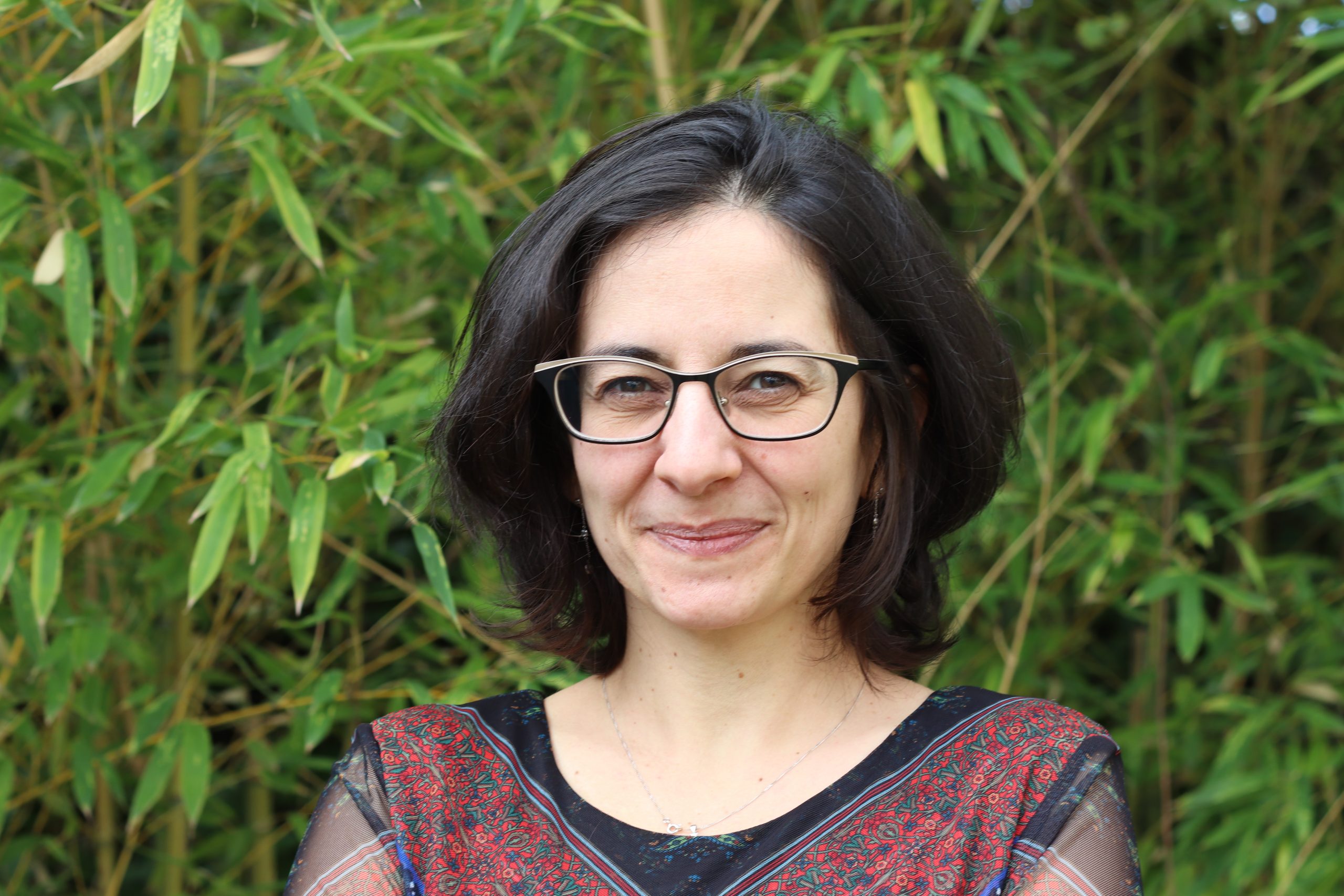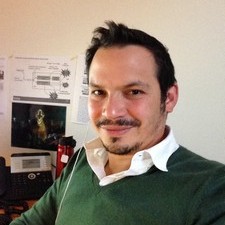Category Archives: Permanent
Amandine Pastor
 Amandine Pastor is a researcher at INRAE and works on the integration of ecosystem services and spatial dimensions of water and carbon in life cycle assessment. Previously, she worked at the Faculty of Sciences of Lisbon in the framework of the H2020 LOCOMOTION project aiming at integrating water and soil dynamics in an integrated assessment model based on renewable energy use.
Amandine Pastor is a researcher at INRAE and works on the integration of ecosystem services and spatial dimensions of water and carbon in life cycle assessment. Previously, she worked at the Faculty of Sciences of Lisbon in the framework of the H2020 LOCOMOTION project aiming at integrating water and soil dynamics in an integrated assessment model based on renewable energy use.
She is an agricultural engineer and holds a PhD in hydrology from Wageningen University (Netherlands). She has worked on the impact of global change on water resources and the different trade-offs between environmental flows and food security. She is specialized in earth system modelling, climate change and ecosystem services. She also has field experience in sustainable agriculture and soil and water conservation projects in Europe and overseas.
Topic: Land use, environmental flows, life cycle assessment, ecosystem services, earth system model, climate change
amandine.pastor@inrae.fr
amandine.pastor#inrae.fr
Alexis Thoumazeau
Alexis THOUMAZEAU, 25 years old is graduated of a master in agricultural sciences from Ecole Supérieure d’Agriculture d’Angers (2015) and specialised in agricultural and soil sciences in the tropics. After his master, Alexis started a PhD at CIRAD in 2015 both within the UMR Eco&Sols and the UPR Perenial crops systems. His PhD topic is focused on the integration of the soil qualtiy within environmental assessment frameworks. After having spent half his PhD in Thailand for field works under rubber tree plantations developping a new approach to assess soil functioning, Alexis works on the integration of the soil quality in the LCA. His research topics are : environmental assessment, indicator, LCA, soil quality, perenial cropping systems.
Angel Avadi
Angel Avadí is a researcher at CIRAD, research unit Recycling and risk. He deals with the environmental assessment of solutions for the recycling of organic residues, especially regarding strategies for returning nutrients to agricultural soils. Previously, in 2014, he completed a PhD from Université Montpellier 2 and IRD focused on the sustainability assessment of supply chains based on the wild caught Peruvian anchovy. These supply chains include fisheries, reduction into fishmeal and fish oil, aquaculture and fish processing for direct human consumption. In 2014-2015, he engaged in postdoc research at INRA Rennes on the challenges of applying life cycle assessment to describe whole agricultural regions. His academic training at the undergraduate and master levels spans IT (with focus on e-learning), business and sustainability science (material flow management and other aspects of industrial ecology).
Yannick Biard
Yannick Biard is an agronomist from Montpellier SupAgro (Master’s Degree 2009) specialized in life cycle assessment, associated databases and calculations tools. He is also skilled in project management and calculation tools dedicated to agronomy and environment.
He first worked as the project manager of the Agri-BALYSE program (ADEME) in 2010. This participative program is developed by a large consortium consisting of ten institutes for applied agricultural research and three agricultural research institutes specialized in the environmental assessement of farming systems. The objective is to create a public life cycle inventory (LCI) database of French agricultural raw products, applying a consistent methodology for the establishment of LCIs of crop and animal products at the farm-gate.
Yannick Biard joined the CIRAD in 2011. At the interface between agronomist and LCA scientists, his main objectives are:
- To do LCA studies of tropical products through the use of CIRAD expertise and data.
- To raise methodological issues for the LCA scientists.
- To develop and manage the LCA/LCI database of CIRAD on tropical products.
Topics: life cycle assessment studies, databases, inventories, ecoinvent, simaPro, ILCD
Sandra Payen
Researcher, Cirad
2012- 2015: PhD student, Cirad – ADEME
Publication:
Payen, S., Basset-Mens, C., Perret, S., LCA of local and imported tomato: an energy and water trade-off, Journal of Cleaner Production (2014), http://dx.doi.org/10.1016/j.jclepro.2014.10.007.
Thierry Tran
Researcher, Cirad, Montpellier
Activities: Development of the Life Cycle Analysis approach for the evaluation of tropical agro-industrial transformation processes:
– Evaluation and comparison of the environmental benefits and costs of various technological solutions.
-Support for the choice of technologies minimizing environmental impacts.
– Development of a database of environmental inventories for the production and transformation of agro-industrial tropical products.
Contact
E-mail: thierry.tran#cirad.fr
Eva Risch
Eva Risch graduated from the Bordeaux Higher National School of Physics and Chemistry in September 2009 with an engineering background in physics and chemistry and a research masters in environmental chemistry. In May 2010, Eva joined the ELSA Team as a Irstea research engineer. Her role is to help develop Life Cycle Assessment methodologies by carrying research on certain environmental processes. She has focused on wastewater treatment efficiencies, comparing a conventional activated sludge wastewater treatment plant with a vertical flow constructed wetland as part of a Irstea – ONEMA (French National Agency for Water and Aquatic Environments) collaboration. Her interests include elemental mass balances in the studied processes, which allow one to quantify their utility functions as per the treatment of waste waters.
Topics: Life cycle assessment, wastewater treatment plant, vertical flow constructed wetlands, activated sludge, elemental mass balance.
Miguel Lopez-Ferber
Professor, EMA
Guillaume Junqua
Associate Professor, Ecole des Mines d’Alès
Eléonore Loiseau
 Eléonore Loiseau graduated from AgroParisTech (Master’s degree, 2008) and from AgroParisTech – Engref (Post-Master degree for Management and Administration in environmental sciences and policies, 2010). She did her PhD thesis at ELSA on methodological proposals for performing an environmental assessment of territories based on the Life Cycle Assessment (LCA) framework, with an implementation in the French Mediterranean case study of ‘Bassin de Thau’. Since 2014, she has been working as a researcher in Irstea ITAP unit developing research on “territorial LCA” approach.
Eléonore Loiseau graduated from AgroParisTech (Master’s degree, 2008) and from AgroParisTech – Engref (Post-Master degree for Management and Administration in environmental sciences and policies, 2010). She did her PhD thesis at ELSA on methodological proposals for performing an environmental assessment of territories based on the Life Cycle Assessment (LCA) framework, with an implementation in the French Mediterranean case study of ‘Bassin de Thau’. Since 2014, she has been working as a researcher in Irstea ITAP unit developing research on “territorial LCA” approach.
Topics: Life Cycle Assessment, Environmental Assessment, Territory, Eco-efficiency, Land use functions, Hybrid LCA, Process LCA, Environmental Input Output (EIO) LCA
Publications:
PhD Thesis:
Loiseau E., 2014. Methodogical proposals for performing an environmental assessment of territories based on the Life Cycle Assessment (LCA) framework. PhD Thesis, Montpellier SupAgro, 280 p.
Link to her PhD dissertation: HERE
Articles in peer-reviewed scientific journals:
Loiseau E., Roux P., Junqua G., Maurel P., Bellon-Maurel V., 2014. Implementation of an adapted LCA framework to environmental assessment of a territory: important learning points from a French Mediterranean case study. Journal of Cleaner Production, in press. DOI: 10.1016/j.jclepro.2014.05.059
Loiseau E., Roux P., Junqua G., Maurel P., Bellon-Maurel V., 2013. Adaptation of the LCA framework to environmental assessment in land planning. International Journal of Life Cycle Assessment, 18, pp 1533-1548. DOI:10.1007/s11367-013-0588-y
Loiseau E., Junqua G., Roux P., Bellon-Maurel V., 2012. Environmental assessment of a territory: an overview of existing tools and methods. Journal of environmental management, 112, pp 213-225. DOI: 10.1016/j.jenvman.2012.07.024
eleonore.loiseau@irstea.fr
Catherine Macombe
Dr Catherine Macombe HdR, is an agronomist and an ingénieur des Ponts, des Eaux et des Forêts. She helds a PhD in Management Science from Clermont Ferrand I University, and the HdR (habilitation à diriger la recherche) in Management Sciences. She is a researcher at Cemagref since 2002, and joined the ITAP research Unit at Irstea Montpellier, in October 2009. She is working on the delivering of methods devoted to assess social impacts caused by future or past changes along the life cycle of products. She is collaborating with about fifteen social scientists, within the group ELSA-social LCA. Theses are dealing mainly with food product industries, but the methods might be relevant for other fields.
Topic: Social Life cycle assessment
catherine.macombe#irstea.fr
Cécile Bessou
Cécile Bessou is an agronomist from ENESAD, Dijon (Master degree, 2001), specialized in resource management and rural development in tropical areas (ENGREF, Montpellier, and MSc at the TU Munich) and doctor in environmental sciences (PhD degree, 2009) from AgroParisTech, Paris. Within the three-year PhD project, she developed her skills in Life Cycle Assessment (LCA) while focusing on the modeling of agricultural field emissions with case studies on biofuels.
Since 2010, she has been working at CIRAD within the research unit on perennial cropping systems (UPR 34). The researchers within this team work on both agricultural and environmental issues concerning perennial crops such as Oil Palm, Rubber or Coffee tree. Cécile works on the assessment of oil palm environmental impacts, notably on the development and adaptation of the LCA methodology and agri-ecological indicators for the oil palm. Her main research activities, together with the scientists from the Hortsys research unit, cover inclusion of variability of cropping systems, modeling environmental fluxes and perennial cycles within LCA, and harmonization of methods and results comparability.
Topics : Life cycle assessment, cropping systems, perennial crops, oil palm, agri-ecological indicators, tropics, flux modelling, environment, variability.
Anthony Benoist
Anthony Benoist is a PhD in Energetics from Ecole des Mines ParisTech (2009). He has also a French diploma of General Engineering and a Master’s degree in Process engineering from Ecole Centrale de Paris (2006).
He works since 2010 as a researcher on environmental assessment on a life cycle basis of bioenergy chains, in tropical regions, in the Bioenergy unit of CIRAD, Montpellier. His activities are mainly focused on vegetable oil (for local production of electricity for instance) and wood for energy purposes (carbonization, gasification, pyrolysis, etc).
Topics: Life cycle assessment, bioenergy, oil crops, ligno-cellulosic feedstocks, land-use changes.
Arnaud Hélias
 Arnaud Hélias has a background in biological systems modelling and devotes his research activity to the environmental impacts of human activities, within the reference framework of Life Cycle Assessment. He is interested in the modelling of causal relationships, from the determination of pollutant emissions and resource consumption to the quantification of damage caused to ecosystems. The objective is to find a compromise between representativeness and operationality.
Arnaud Hélias has a background in biological systems modelling and devotes his research activity to the environmental impacts of human activities, within the reference framework of Life Cycle Assessment. He is interested in the modelling of causal relationships, from the determination of pollutant emissions and resource consumption to the quantification of damage caused to ecosystems. The objective is to find a compromise between representativeness and operationality.
Arnaud Hélias, PhD (2003) and habilitation (2016) in process engineering is an INRAE senior scientist. He is the author of about sixty articles and has been in charge of environmental assessment in several collaborative projects (ANR Symbiose, Phosph’OR, WinSeaFuel, GreenAlogOhol, Cost-to-Coast, FUI Salinalgue, Algraal, Ademe Surfact’Alg…). He also holds the Elsa-Pact industrial chair in LCA, is chairman of the scientific and technical council of the GIS Revalim (a scientific group composed by Ademe – INRAE – agricultural and agri-food technical centres, on French agricultural data for LCA), and is an expert for the government on the environmental labelling of food and textile products, expert for the scientific council of IFPEN (French Institute for Petroleum and New Energies), active member of the GLAM initiative (creation of a global life cycle impact assessment method, under the aegis of the United Nations Environment Programme), head of the joint research unit ITAP: Technologies and methods for tomorrow’s agriculture and from 2014 to 2018, leader of the Elsa group.
Topics: Ecodesign, Training, Life cycle assessment, microalgae, seaweed, anaerobic digestion, dynamical modelling, inventory.


